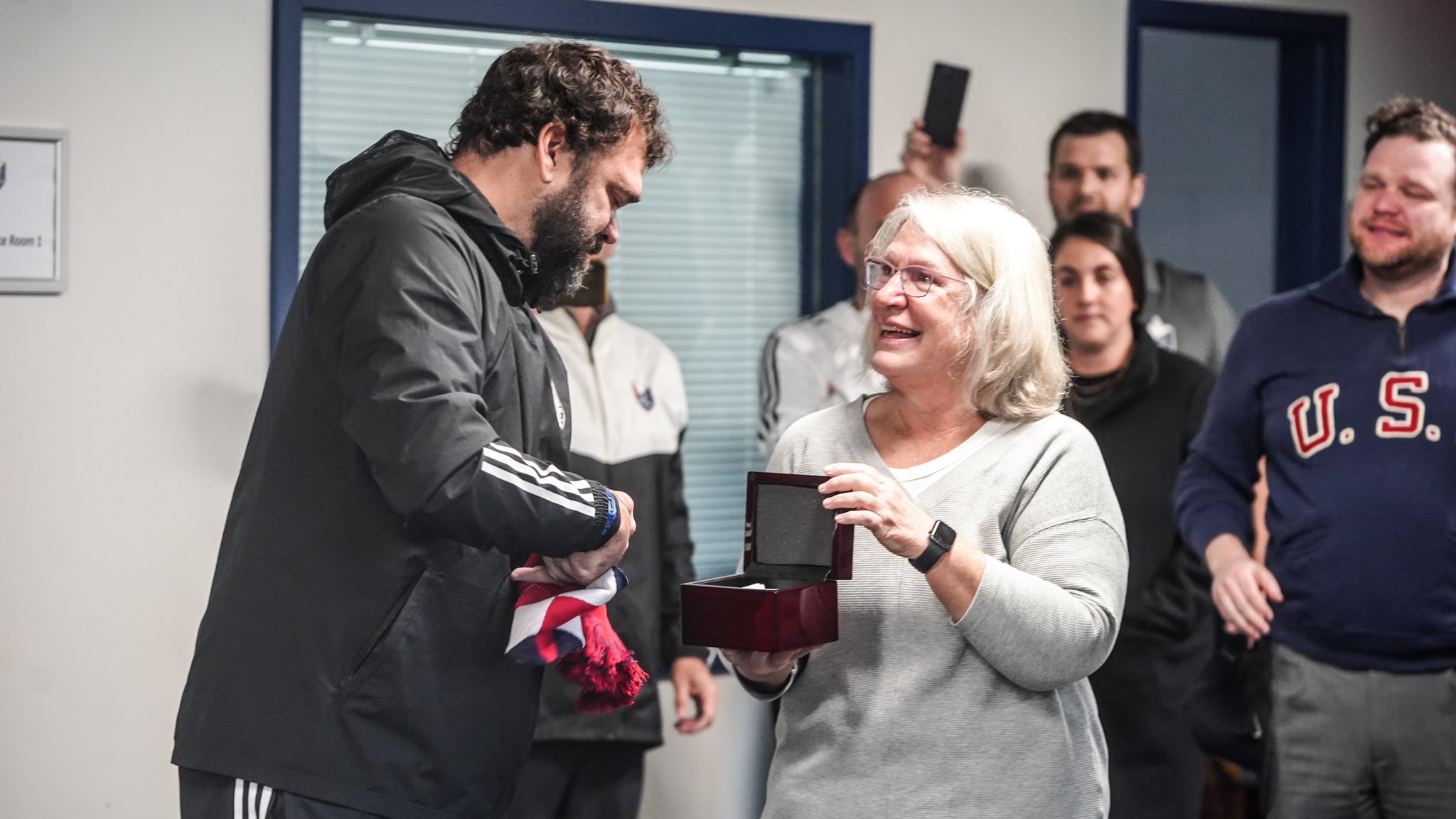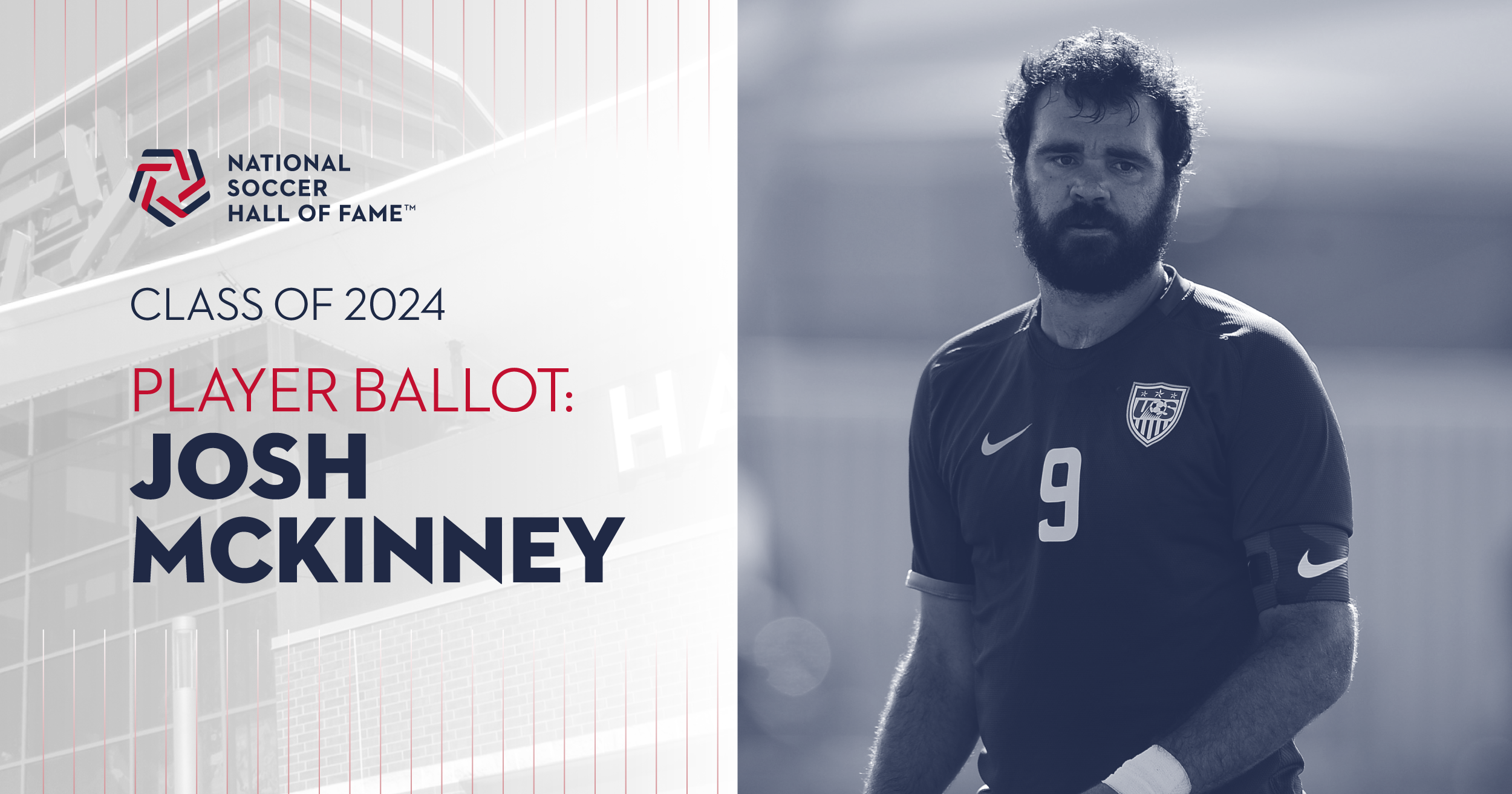Paralympian Josh McKinney Elected to the National Soccer Hall of Fame

Midfielder will become the first member of the U.S. Extended National Teams to be inducted
Little did 5-year-old Josh McKinney realize that playing soccer would change his life.
He was born with cerebral palsy, which primarily affected his right side. His mother, Nancy, played soccer in high school and felt that competing in the sport would be a way to help her son get better, so she enrolled Josh in a soccer program at a local recreation center.
“She thought it would be good for me,” McKinney told The Washington Post in 2002.
And it was, in so many ways.
“We noticed that all the running was good for my cerebral palsy,” he told the Southern Soccer Scene in 2013. “It was like therapy. Since I started, I have gotten much stronger, though you can still see a difference on my right side.”
Nancy McKinney felt her son’s performance proved an important point.
“We just wanted him to know that you can do it,” she told the North Carolina Soccer Hall of Fame when the Raleigh native was inducted in 2015. “No matter what it is, do it and don’t lower your expectations.”

McKinney became so proficient at the sport that he became a force not only on the U.S. Para National Team, but as one of the top Cerebral Palsy (CP) National Team players in the world. As a midfielder, he scored 81 goals in 124 appearances for the U.S. He competed in three Paralympic Games, helping the Americans to a fourth-place finish at the 1996 Atlanta Games and a silver medal at the 2010 Copa America in Buenos Aires.
In 2021, he and goalkeeper Keith Johnson became the first U.S. Soccer Extended National Team members to be listed on the final 20-player ballot for the National Soccer Hall of Fame.
“It’s definitely great news for all athletes within the ENTs to get that recognition for competing for the U.S.,” McKinney told USSoccer.com. “Hopefully within a couple years someone from the ENTs gets inducted.”
That time has come. McKinney has become the first Extended National Team player to be elected to the Hall of Fame; he will be inducted during ceremonies in Frisco, Texas, on May 4, 2024.

McKinney’s worth to the Paralympics team and program was evident from more than just mere numbers. His special qualities as a vocal leader and captain of the squad did not go unnoticed by his coaches.
“To get to and remain at the top for over two decades takes a lot of sacrifice,” U.S. Men’s CP National Team coach Stuart Sharp told the North Carolina Soccer Hall of Fame. “Josh has always been willing to put the needs of his country in front of many of his own personal ambitions.”
Jay Hoffman, a former U.S. Paralympic coach, told the Southern Soccer Scene: “His leadership, commitment and dedication to the program and representing our country is a lot deeper. In my 10 years as head coach, he has never missed an event or training camp.”
McKinney was born on Jan. 18, 1979. Growing up, he had a pair of built-in mentors at home with older brothers who had soccer experience; Chris McKinney competed for West Virginia University and the Syracuse Salty Dogs, and Jeff McKinney played for Davidson College.
Growing up in the game, Josh faced challenges competing against other teams that had able-bodied players.
“My first couple years on club, when I was 12-13, it was kind of difficult being on the team,” he told USSoccer.com. “I got maybe five minutes of playing time in a game. Three years later, after I figured out how to stay on the field, I was starting every game.”

He improved, and he was able to play on his high school team at Hilton Head Prep. As a 16-year-old in 1995, Josh noticed an ad for a disabled national team while flipping through the pages of Eurosport Magazine. After sending in a video, he was invited to become a part of Team USA at the 1995 CRPSRA Pan-American Games in Mar del Plata, Argentina.
He made an unforgettable international debut, scoring four times as the Americans edged Brazil, 5-4, in the opener.
“It was a great experience,” McKinney told USSoccer.com. “I was 16 and didn’t know what to expect. It was the first time I had ever competed against someone else with a disability.”
Next came the 1996 Atlanta Paralympics, and after the U.S. scored an own goal against Brazil, 17-year-old McKinney led a comeback, scoring twice en route to a 4-1 triumph in front of the great Pelé.
“We actually took a team photo with [Pelé] before the game and got to shake his hand,” McKinney told USSoccer.com. “It was thrilling to score against Brazil, but it was made even more special when I found out he stayed to watch the game.”
The U.S. reached the medal round but lost to Spain, 2-1, in the bronze-medal match. McKinney led the team with five goals as the Americans finished in fourth place, their best Paralympic showing.
After attending Concord University from 1999 to 2002, McKinney competed at the 2004 Athens Games and the 2012 London Games. The U.S. finished eighth on both occasions.
Among his accomplishments in international play, McKinney earned Golden Boot honors at a 2002 tournament in the Netherlands, and he picked up his 100th international cap against Russia in a 2012 friendly at Yevpatoriya, Ukraine.
He retired from competition in June 2014, tallying the 81st goal and final goal of his stellar career in a 3-0 victory over Portugal at the International Trophy of a 7-a-side Football Tournament in Barcelona.
“Getting to represent your country, it’s great,” he told USSoccer.com. “Everyone who competes in soccer, that’s kind of their dream. Being able to do that for so long was great. I definitely had the support behind me with my parents and brothers to be able to compete for such a long time, even when I was working and playing at the same time, they were behind me helping me out.
“I loved every minute of it — going out, traveling, getting to compete against other countries, representing the U.S. It’s one of the best feelings you can get, especially when that’s your dream.”
After his retirement, McKinney was inducted into the North Carolina Soccer Hall of Fame and West Virginia Soccer Association Hall of Fame. He has conducted clinics for Washington-area youths with physical disabilities and traumatic brain injuries, along with his U.S. teammate, the late Jon McCullough.
“I want to do this to give the kids the same opportunities that I had,” McKinney told The Washington Post.
A longtime resident of Cary and Raleigh, he decided to create a soccer program for people with disabilities, and he asked the Capital Area Soccer League for help.
“When he approached us, we were excited to help him,” CASL director of coaching Rusty Scarborough told the Southern Soccer Scene. “We never had a program for people with disabilities before, so we think it is a good thing. We’re very honored to work with this tremendous young man.”
More recently, McKinney also has directed Boys Under-11, U-12 and U-13 boys teams for the North Carolina Football Club in Raleigh, as he continues to give back to the game.
